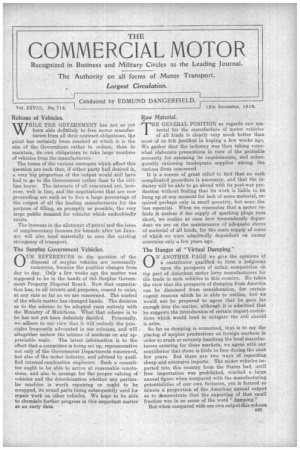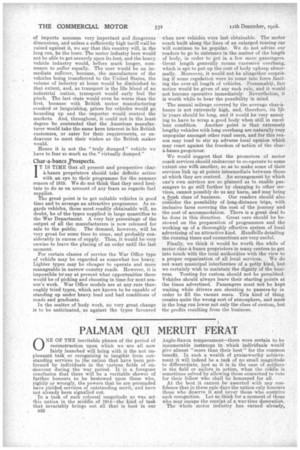Release of Vehicles.
Page 1

Page 2

If you've noticed an error in this article please click here to report it so we can fix it.
WEILLE THE GOVERNMENT has not as yet been able definitely to free motor manufacturers from all their contract obligations, the point has certainly been reached at which it is the aim of the Government rather to reduce, than to maintain, its own obligations to take large numbers of vehicles from the manufacturers.
The terms of the various contracts which affect this question are such that, if either party had desired it, a very big proportion of the output would still have had to go to the Government rather than to the civilian buyer. The interests of all concerned are, however, well in line, and the negotiations that are now proceeding are such as to free a large percentage of the output of all the leading manufacturers for the purpose of filling, as promptly as possible, the very large public demand for vehicles which undoubtedly exists.
The increase in the allotment of petrol and the issue of supplementary licences for benzole after 1st January will also tend materially to case the existing stringency of transport.
The Surplus Government Vehicles.
OUR REFERENCES to the question of the disposal of surplus vehicles are necessarily numerous, because the position changes from day to day. Only a few weeks ago the matter was supposed to be in the hands of thi; Surplus Government Property Disposal Board. Now that organization has, to all intents and purposes, ceased to exist, at any rate so far as we are concerned. The control of the whole matter has changed hands. The decision as to the scheme to be adopted rests entirely with the Ministry of Munitions. What that scheme is to be has not yet been definitely decided. Personally, we adhere to our view that it will embody the principles frequently advocated in our columns, and will altogether eschew the scheme of auctions on any ap preciable scale. The latest information is to the effect that a committee is being set up, representative not only of the Government Departments concerned, but also of the motor industry, and advised by qualified internal-combustion engineers. Such a committeeought to be able to arrive at reasonable conclusions, and also to arrange for the proper valuing of vehicles and the deterinination whether any particular machine is worth repairing or ought to be scrapped, its sound parts being subsequently used for repair work on other vehicles. We hope to be able to chronicle further progress in this important matter at an early date. Raw Material. THE GENERAL POSITION as regards raw material for the manufacture of motor vehicles of all kinds is clearly very much better than most of us felt justified in hoping a few weeks ago. We gather that the industry was then taking somewhat elaborate precautions in view of the probable necessity for assessing its requirements, and subsequently rationing inadequate supplies among the various firms concerned.
It is a source of great relief to find that no such complicated procedure is necessary, and that the industry will be able to go ahead with its post-war production without feeling that its work is liable to be hung up at any moment for lack of some material, required perhaps only in small quantity, but none the less essential. When we remember that a motor vehicle A useless if the supply of sparking plugs runs short, we realize at once how tremendously dependent we are on the maintenance of adequate stores of material of all kinds, for the main supply of some of which we were admittedly dependent on enemy countries only a few years ago.
The Danger of "Virtual Dumping."
0 N ANOTHER PAGE we give the opinions of a contributor qualified to form a judgment upon the prospects of unfair competition on t1t? part of American motor lorry manufacturers for the trade in such vehicles in this country. He takes the view that the prospects of dumping from America can be dismissed from consideration, for certain cogent reasons which he is able to outline, but we would not be prepared to agree that he goes far enough into the maiter, although it is admitted that he suggests the introduction of certain import restrictions which would tend to mitigate the evil should it arise. So far as dumping is concerned, that is to say the placing of surplus productions on foreign markets in order to crush or severely handicap the local manufacturers catering for these markets, we agree with our contributor that there is little to fear during the next few years. But there are two ways of regarding cheap and extensive imports. The motor vehicles imported into this country from the States had, until free importation was prohibited, reached a large annual figure when compared with the manufacturing potentialities of our own factories, yet it formed so minute a proportion of the American annual output as to ckmonstrate that the exporting of that small fraction was in no sense of the word " dumping." But when compared with our own output this volume of imports assumes very important and dangerous dimensions, and unless a sufficiently high tariff wall be raised against it, we say that this country will in the long run, be the loser. The motor industry here would not be able to get securely upon its feet, and the heavy vehicle industry would, before much longer, commence to ,suffer equally. The user would be an immediate sufferer, because, the manufacture of the vehicles being transferred to the United States, the volume of industry at home would be diminished to that extent, and, as transport is the life blood of an industrial nation, transport would early feel the pinch. The last state would even be worse than the first, because with British motor manufacturing crushed or languishing, prices for vehicles would go bounding up and the importer would control the markets. And, throughout, it could not in the least degree be contended that the American manufacturer would take the same keen interest in his British customers, or cater for their requirements, or endeavour to meet their wishes as the British maker would.
Hence it is not the "truly dumped" vehicle we have to fear so much as the." virtually dumped."
Char-a-banes Prospects.
IT IS TIME that all present and prospective char-banes proprietors proprietors should take definite action with an eye to their programme for the summer season of 1919. We do not think that they need hesitate to do so on account of any fears as regards fuel supplies.
The great point is to get suitable vehicles in good time and to arrange an attractive programme. As regards vehicles, those most readily obtainable will, no doubt, be of the types supplied in large quantities to the War Department A very fair percentage of the output of all the manufacturers is now released for sale to the public. The demand, however, will be very great for some time to come, and probably considerably in excess of supply. Thus, it would be very unwise to leave the placing of an order until the last moment. .
For certain classes of service the War Office type of vehicle may be regarded as somewhat too heavy. Lighter types may be cheaper to operate and more manageable in narrow country roads. However, it is impossible WI say at present what opportunities there would be of picking and choosing in time for next season's work. War Office models are at any rate thoroughly tried types, which are known to be capable of standing up under heavy_ load and bad conditions of roads and gradients.
In the matter of body work, no very great change is to be anticipated, as against the types favoured v-hen new vehicles were last obtainable. The motor coach built along the lines of an enlarged touring car will continue to be popular. We do not advise our readers to go to extremes in the matter of the length of body, in order to get in a few more passengers.
Great length generally means excessive overhang, which is apt to put up the cost of body upkeep abnormally. Moreover, it would not be altogether surprising if some regulation were to come into force limit-. ing the over-all length of vehicles. Presumably, fair notice would be given of any such rule, and it would not become operative immediately. Nevertheless, ii is worth while to bear the possibility in mind.
The annual mileage covered by the average char-abanes is not extremely high, and, therefore, its lifr in 'years should be long, and it would be very annoy ing to have to scrap a good body when still in excellent condition. Another point is that extremely lengthy vehicles with long overhang are naturally very unpopular amongst other road users, and for this reason may tend to stir up adverse local opinion which may react against the freedom of action of the chara-banes proprietor.
We would suggest that the promoters of motor coach services should endeavour to co-operate to some extent one with another, so as to make some of their services link up at points intermediate between those at which they are centred. An arrangement by which one's own services are so planned as to enable pas sengers to go still further by changing to other services, cannot possibly do us any harm, and may bring a, treah class of business. Our readers should also consider the possibility of long-distance trips, with inclusive fares covering the cost of the journey and the cost of accommodation. There is a great deal to be done in this direction. Great care should be bestowed on the preparation of programmes and the working up of a thoroughly effective system of local advertising of an attractive kind. Handbills detailing the running times and connections are very useful.
Finally, we think it would be worth the while of motor char-asbancs proprietors in many centres to get into touch with the local authorities with the view to a proper organization of all local services, Wo do not want municipal interference of a petty kind, but we certainly wish to maintain the dignity of the busi ness. Touting for custom should not be permitted. Vehicles should always leave their starting points at the times advertised. Passengers must not be kept waiting while dkivers are shouting to passers-by in order to fill the) vacant seats. This kind of thing creates quite the wrong sort of atmosphere, and must in the long run lower not only the class of custom, but the profits resulting from the business.






















